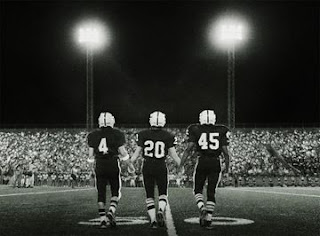by Ben Howard
Batman should have died.
I'm not kidding and I don't particularly care if I'm spoiling the ending. Batman should have died at the end of The Dark Knight Rises. It was the only appropriate way for the trilogy to end. Batman sacrificing himself and passing on his legacy to another.
But of course that's not the way the movie ends. No, instead Batman finds the time in his busy schedule to do a thing to some stuff and dramatically fake his own death.
Sentiment makes for lazy plot mechanics.
This has become a regular part of all superhero movies. In order to emotionally hook the audience there need to be real stakes, the audience has to believe that the hero is actually in danger. Of course, everyone intellectually knows that you can't kill the hero, so you endanger those close to him. It's why Uncle Ben has to die in Spiderman, why Batman's girlfriend has to die in the Dark Knight, or why Tony Stark's cave friend has to die in Iron Man.
But how much emotional capital does an audience really have invested in a character they've only known for half a movie? Not enough. So you have to kill off the star. You have to make it really hurt. You have to make it real.
So you kill Batman, or Sherlock Holmes, or Doctor Who. And then you figure out a way to bring them back to life.
It's a good story, but it's also cheating because real life doesn't come with a writer's room.

My favorite stories are the ones that end in pain, that embrace it, not because it's beautiful, but because it's real. Friday Night Lights is my favorite sports movie almost entirely because at the end of the movie, they lose. You build up so much emotion waiting for the climactic moment, the redemptive moment and then...you fall just short.
Any Game of Thrones fan can speak to author George R.R. Martin's almost maniacal obsession with killing beloved characters. He's even gone so far as to say that the end of the story will be bittersweet.
It's not that I don't believe in happy endings, it's that I don't believe in endings at all. Real life does not fade to black after the ending, it does not have a lovely epilogue where Harry Potter takes his kids to school, nor does it pan back from a funeral to find the supposedly deceased watching from off in the distance. It just keeps going.
We are tempted to deal with pain indirectly or tangentially, pulling back on the throttle before we get too deep. We're tempted to tell only stories that have endings, and since we can't embrace a sad ending, we get stories that end happily ever after.
 That's one of the reasons I'm so drawn to the liturgical traditions of Christianity. The story is one that continually repeats. It goes through the tense darkness of Advent to the pinnacle of Christmas, it descends into the painful remembrance of mortality on Ash Wednesday, the ache of Good Friday and Holy Saturday and the exuberant joy of Easter.
That's one of the reasons I'm so drawn to the liturgical traditions of Christianity. The story is one that continually repeats. It goes through the tense darkness of Advent to the pinnacle of Christmas, it descends into the painful remembrance of mortality on Ash Wednesday, the ache of Good Friday and Holy Saturday and the exuberant joy of Easter. Yet, there are also plains between these peaks and valleys. Life is not an infinite binary of pleasure and pain. There is also the aptly-named Ordinary Time where things are, well, ordinary.
And this happens over and over and over again. There is no end, no beginning, just a continual roll of ups and downs, valleys and peaks and long ordinary plains.
Endings are overrated, but Batman still should have died.
Peace,
Ben
Ben
Howard is an accidental iconoclast and generally curious individual
living in Nashville, Tennessee. He is also the editor-in-chief of On Pop
Theology and an avid fan of waving at strangers for no reason. You can
follow him on Twitter @BenHoward87.
You can follow On Pop Theology on Twitter @OnPopTheology or like us on Facebook at www.facebook.com/OnPopTheology.
You might also like:


No comments:
Post a Comment